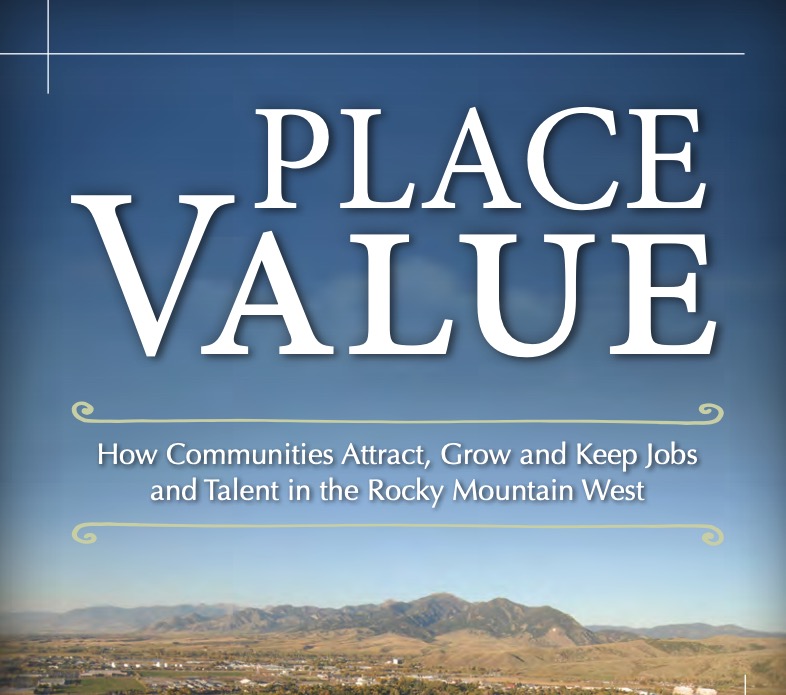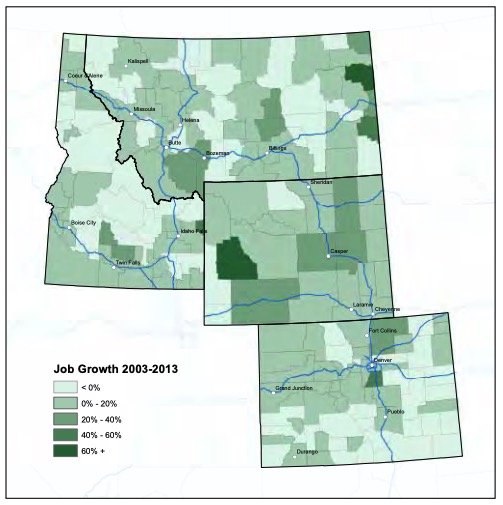COMMUNITY BUILDERS
Executive Summary
 Local leaders intuitively recognize that building a great community is essential to building a strong and resilient economy, but what underlies this linkage and how can communities strengthen it?
Local leaders intuitively recognize that building a great community is essential to building a strong and resilient economy, but what underlies this linkage and how can communities strengthen it?
These are the guiding questions behind the Place Value study, which explores why people and businesses are drawn to particular communities in the Rocky Mountain West.
Place Value comes at a time when many communities are seeking new approaches to economic development that respond to changing market and fiscal realities. What people are seeking from their jobs and communities is also changing. A growing number of people prioritize quality of life over other factors, including employment opportunities, in decisions about where to live, work, or start a business. At the same time, today’s technology and the growth of knowledge-based industries allow people and businesses far greater flexibility in where they locate. Yet for many communities, particularly those with resort economies, high cost of living, long commutes and limited employment opportunities are barriers to attracting and retaining a talented workforce.
Place Value explores these trends and what they mean for Rocky Mountain communities. Drawing on the perspectives of business owners as well as community members, Place Value aims to clarify the role of different community attributes – from taxes and zoning to quality of life and cost of living – in creating and supporting resilient local economies.
Study Methodology
Surveys were distributed to business owners and community members in Colorado, Idaho, Montana and Wyoming through outreach via downtown associations, chambers of commerce, area newspapers and emails. More than 450 business owners responded to the business survey and nearly 500 community members responded to the employee survey. The intent was not to attain a statistical representation of the region, but to get a sufficient number of responses to have a solid level of confidence in the results. The high number of responses received suggests that the survey results include prevalent sentiments about what attracts people and businesses to Rocky Mountain West communities.
Summary of Key Findings
Results of this study, based on a survey of nearly 1,000 employers and community members in Colorado, Idaho, Montana and Wyoming, indicate that building a strong and resilient economy is tied to creating a great community where people want to live and work. Both business owners and community members overwhelmingly prioritize community quality above and beyond other relevant factors, like employment opportunities, salary or business climate, when choosing a place to live or start a business. People are attracted to great places with a variety of neighborhoods, amenities, and transportation choices. In the Rocky Mountain region, people are willing to accept a lower salary in order to live in a community that offers these qualities. However, affordability is an issue, and business owners and community members report that there is not enough housing in many Rocky Mountain communities to meet the needs of people with a diversity of income levels. Other key findings include:
- JOBS FOLLOW PEOPLE. The majority of business owners (70 percent) established their residence in a community first, and then decided to start a business at a later date. Less than one-third of business owners moved to a community with the purpose of opening a business.
- COMMUNITY QUALITY IS A TOP PRIORITY FOR BUSINESSES AND RESIDENTS. In selecting a location to live, the most highly considered factor for business owners and community members was the overall quality of the community, with a score of 4.5 out of 5. Seventy percent of business owners responding to our survey indicated community character was “extremely important.”
- BEING IN A PLACE THAT CAN ATTRACT TALENTED EMPLOYEES IS IMPORTANT TO GROWING BUSINESSES. Sixty-eight percent of business owners with unfilled positions said that the ability to attract or retain talented employees was an important factor in choosing their business location.
- PEOPLE ON THE MOVE ARE LOOKING FOR GREAT PLACES. When making relocation decisions, people consider both the quality of the community and job opportunities. Most respondents (44 percent) felt that a job and the community are equally important factors in relocation decisions. Only 17 percent of respondents indicated job opportunities as the most important consideration.
- PEOPLE ARE WILLING TO SACRIFICE SALARY FOR THE IDEAL COMMUNITY. Eighty-three percent of respondents favored “living in an ideal community with a lesser salary” over “living in a community that’s less than ideal with a high salary.” Safety, open space and trails, access to recreation, neighborhood character, and short commute times are all highly rated factors for people deciding where to live.
- HOUSING COSTS ARE A CONCERN FOR BUSINESSES AND EMPLOYEES. Sixty-eight percent of community respondents felt there are not enough housing options for a range of incomes in their community. This issue matters to businesses too: 60 percent of business owners felt that housing costs had some impact on the ability to attract employees; the number jumps to 76 percent for those that are hiring.
These are just a few of the findings outlined in this report. Other findings relate to telecommuting, how business owners view the business climate in their community, and frustration with commuting, among others.
Challenges and Opportunities in a Changing Economy
 Communities in the Rocky Mountain West face a unique set of challenges and opportunities in today’s rapidly changing economy. A lack of economic diversity and corresponding over-reliance on a particular business or industry sector is a common challenge for many of the region’s communities. Though many localities are working to diversify economically, doing so is difficult, particularly in rural areas, which lack the economic gravity and market dynamics of larger cities.
Communities in the Rocky Mountain West face a unique set of challenges and opportunities in today’s rapidly changing economy. A lack of economic diversity and corresponding over-reliance on a particular business or industry sector is a common challenge for many of the region’s communities. Though many localities are working to diversify economically, doing so is difficult, particularly in rural areas, which lack the economic gravity and market dynamics of larger cities.
These challenges aside, the Rocky Mountain region’s outstanding quality of life has made it one of the fastest growing parts of the country in recent decades. Indeed, over the past 10 years, the number of jobs in the Rocky Mountain West has increased by 14.7 percent, the highest rate of job growth in the nation and three times the national average.
Not surprisingly, the highest rates of job growth in the region are in areas that offer abundant access to public lands and outdoor recreation. These areas also tend to be the fastest growing in terms of population, and have lower poverty rates, higher educational attainment, and a greater proportion of workers employed in knowledge-based professions.
The impact and importance of the region’s quality of life will continue to grow as technology provides ever greater flexibility in where businesses and employees locate. At the same time, a growing number of people are prioritizing quality of life over other factors, including salaries, in deciding where to live, work, or start a business. As a result, communities of all types are competing for the jobs, talent and investment driving our rapidly changing economy.
While the region’s quality of life is clearly an asset, there are many examples of communities with outstanding amenities that struggle with issues related cost of living. This creates regional imbalances in jobs and housing resulting in bedroom communities and long commutes for people driving between where they live and work. In short, as communities succeed in becoming attractive places to live, work and visit, they need to redouble efforts to be a livable community where people can afford to live. This requires attention to housing and transportation choices, which are often overlooked in conventional economic development approaches.
Download full version (PDF): Place Value
About Community Builders
communitybuilders.org
Community Builders focuses on building strong, prosperous communities throughout the Rocky Mountain West by advancing three goals: strengthening local leadership, inspiring community action, and enabling on-the-ground progress.
Tags: business, Community Builders, Rocky Mountain West, Sonoran Institute






 RSS Feed
RSS Feed